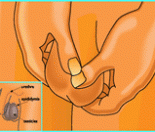September is Cervical Screening Awareness month, so Kiwi Families (KF) interviewed Helen Waaka, RGON, BN, Registered Nurse and Smear-taker to find out the key issues, misconceptions and fears that many women have when contemplating getting a cervical smear.
KF: Helen, how long have you been a Registered Nurse and Smear-taker?
Helen: 30 years as a Registered Nurse and 19 years as a Smear-taker.
KF: So you’d know very well the range of emotions that many women can experience with having a cervical smear?
Helen: Yes, I understand how difficult it can be for women to make the first appointment.
KF: What are some of the major fears about having a cervical smear?
Helen: For some women having a smear test is simple and straight forward, but many other women find it easy to put off. Not knowing what to expect, and concerns about the actual procedure or an abnormal result are other reasons women will put off having a smear and for some, there are practical challenges — working long hours, getting time off work, traveling to and from the appointment, and the cost of doing so.
KF: Are there other obstacles?
Helen: A lot of women put everything and everybody else before themselves. Most women lead busy active lives, working, (sometimes at two jobs), raising families, being involved in the community and other activities that usually centre around other people. Taking time out to look after themselves often comes after everyone and everything else.
KF: Is cost an issue?
Helen: Nurses at GP clinics, Whare Rapuora, and other community providers are available to take smears, with some hauora providers, community or primary health organizations offering a free or low cost service. Women may be charged the usual or a reduced fee at GP health centres for their cervical smear.
KF: Are there cultural issues?
Helen: Having a cervical smear is viewed by many Maori women as being “whakama” or embarrassing. Many women are initially embarrassed, but accessing a woman smear-taker they feel comfortable with, who can provide a private, caring and relaxed process will help.
KF: Which leads us to the emotional concerns?
Helen: As smear-takers it is important that we ensure having a smear test is a positive experience especially for women having their first smear. Many women experience fear of the unknown, so careful explanation of the procedure and a calm relaxed atmosphere can help to make the experience a comfortable and positive one.
KF: Can a woman bring a support person?
Helen: For some women going to a health centre with other friends or whanau to provide encouragement to each other is helpful. Women are welcome to take a support person in during the procedure.
KF: Is it painful?
Helen: Having a smear test shouldn’t be painful. Some women experience mild discomfort, but for most women it is a simple process and completed within a few minutes.
KF: Is the first smear test appointment the biggest obstacle?
Helen: Not knowing what to expect is a concern for women having their first smear. If the procedure is fully explained and the first smear test is a positive experience then women will be relaxed, understand the benefits, and hopefully have fewer concerns with subsequent smear tests.
KF: How often do you need a smear test?
Helen: All women who have ever been sexually active between 20 – 70 years should have a regular smear test once every 3 years.
KF: Why every 3 years?
Helen: This type of cancer usually develops very slowly, and can take up to 10 or more years to develop and regular three yearly smears will detect any abnormal cells before they become cancerous. More frequent screening or referral for colposcopy may be necessary if abnormal cells are found.
KF: What is the single biggest benefit?
Helen: Cervical cancer is the 2nd most common cancer in women worldwide, but it is one of the most preventable of all cancers. By smear testing every 3 years you can reduce your chances of developing cervical cancer by around 90%.
KF: Helen, thanks for taking the time to share your experiences and insights.
Helen: If your Readers would like any further information on this subject, click through to the National Cervical Screening Programme website — www.nsu.govt.nz — or contact your local NCSP Regional Service on 0800 729 729.




